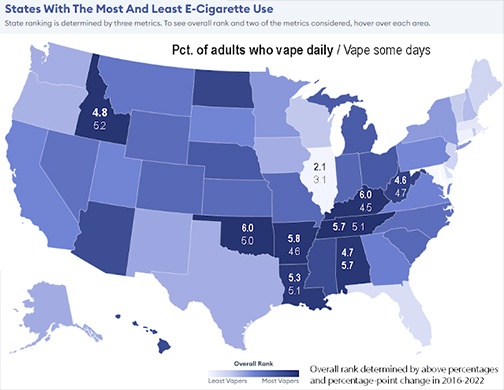Ky. and Okla. lead the nation in adult daily vaping; with additional metrics, Forbes ranks Ky. as the No. 2 vaping state, behind Tenn.
Published 10:52 am Monday, February 12, 2024
By Kentucky Health News
Kentucky adults use electronic cigarettes daily at the highest rate in the nation, equaled only by Oklahoma, according to an analysis of Centers for Disease Control and Prevention data by Forbes.
The magazine says 6 percent of adults in Kentucky vape daily, and another 4.5% vape on “some days,” for a totla of 10.5%. In Oklahoma, the rates are 6% and 5% for a total of 11%.
The magazine used daily and occasional vaping rates, and the increase in those rates among adults from 2016 to 2022, to rank the states in prevalence of vaping. Kentucky was second only to Tennessee, where 5.7% of adults vape daily and another 5.1% vape occasionally, for a total of 10.8%.
In smoking traditional cigarettes, Kentucky adults also rank second, just behind those in West Virginia. Youth smoking has declined as vaping has increased.
The 2021 Youth Risk Behavior Survey found that 4.9% of Kentucky high-school students said they smoked cigarettes and 21.9% said they used electronic vapor products. Among middle schoolers, the 1.6% said they currently smoked cigarettes and 13.8% used a vapor product. “Current use” is considered having used a product on at least one day during the 30 days prior to the survey.
“Kentucky historically has had pretty high tobacco use rates across all forms of tobacco, and we’re still, unfortunately, seeing that with e-cigarettes and vaping not only with youth but also adults,” Dr. Melinda Ickes, assistant dean for research at the University of Kentucky College of Education, told WDKY.
“Even if someone is curious and just tries it a couple of times, the risk of dependency increases significantly. These products are certainly not harmless, and especially for young people, they can have lasting effects like mood disorders, impacting brain development, and things related to mental health.”
Kentucky’s high smoking rate affects nonsmokers, by adding to the health-care costs borne by taxpayers and the effects of secondhand smoke.
— Kentucky Health News is an independent news service of the Institute for Rural Journalism in the School of Journalism and Media at the University of Kentucky, with support from the Foundation for a Healthy Kentucky.


